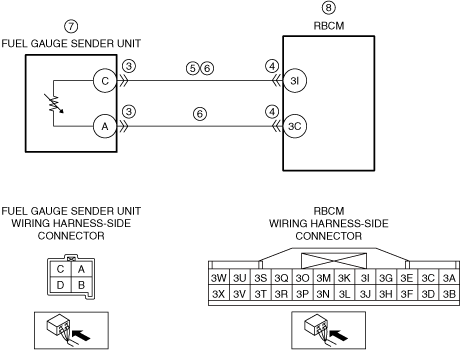|
1
|
RECORD VEHICLE STATUS AT TIME OF DTC DETECTION TO UTILIZE WITH REPEATABILITY VERIFICATION
-
Note
-
• Recording can be facilitated using the screen capture function of the PC.
• Record the FREEZE FRAME DATA/snapshot data on the repair order.
|
—
|
Go to the next step.
|
|
2
|
VERIFY RELATED REPAIR INFORMATION AVAILABILITY
• Verify related Service Bulletins and/or on-line repair information availability.
• Is any related repair information available?
|
Yes
|
Perform repair or diagnosis according to the available repair information.
• If the vehicle is not repaired, go to the next step.
|
|
No
|
Go to the next step.
|
|
3
|
INSPECT FUEL GAUGE SENDER UNIT CONNECTOR CONDITION
• Switch the ignition off.
• Disconnect the fuel gauge sender unit connector.
• Inspect for poor connection (such as damaged/pulled-out pins, corrosion).
• Is there any malfunction?
|
Yes
|
Repair or replace the connector and/or terminals, then go to Step 10.
|
|
No
|
Go to the next step.
|
|
4
|
INSPECT REAR BODY CONTROL MODULE (RBCM) CONNECTOR CONDITION
• Disconnect the rear body control module (RBCM) connector.
• Inspect for poor connection (such as damaged/pulled-out pins, corrosion).
• Is there any malfunction?
|
Yes
|
Repair or replace the connector and/or terminals, then go to Step 10.
|
|
No
|
Go to the next step.
|
|
5
|
INSPECT FUEL GAUGE SENDER UNIT SIGNAL CIRCUIT FOR SHORT TO POWER SUPPLY
• Verify that the fuel gauge sender unit and rear body control module (RBCM) connectors are disconnected.
• Switch the ignition ON (engine off).
-
Note
-
• Another DTC may be stored by the PCM detecting an open circuit.
• Measure the voltage at the fuel gauge sender unit terminal C (wiring harness-side).
• Is the voltage 0 V?
|
Yes
|
Go to the next step.
|
|
No
|
Refer to the wiring diagram and verify whether or not there is a common connector between fuel gauge sender unit terminal C and rear body control module (RBCM) terminal 3I.
If there is a common connector:
• Determine the malfunctioning part by inspecting the common connector and the terminal for corrosion, damage, or pin disconnection, and the common wiring harness for a short to power supply.
• Repair or replace the malfunctioning part.
If there is no common connector:
• Repair or replace the wiring harness which has a short to power supply.
Go to Step 10.
|
|
6
|
INSPECT FUEL GAUGE SENDER UNIT CIRCUIT FOR OPEN CIRCUIT
• Verify that the fuel gauge sender unit and rear body control module (RBCM) connectors are disconnected.
• Switch the ignition off.
• Inspect for continuity between the following terminals (wiring harness-side):
-
― Fuel gauge sender unit terminal C—Rear body control module (RBCM) terminal 3I
― Fuel gauge sender unit terminal A—Rear body control module (RBCM) terminal 3C
• Is there continuity?
|
Yes
|
Go to the next step.
|
|
No
|
Refer to the wiring diagram and verify whether or not there is a common connector between the following terminals:
• Fuel gauge sender unit terminal C—Rear body control module (RBCM) terminal 3I
• Fuel gauge sender unit terminal A—Rear body control module (RBCM) terminal 3C
If there is a common connector:
• Determine the malfunctioning part by inspecting the common connector and the terminal for corrosion, damage, or pin disconnection, and the common wiring harness for an open circuit.
• Repair or replace the malfunctioning part.
If there is no common connector:
• Repair or replace the wiring harness which has an open circuit.
Go to Step 10.
|
|
7
|
INSPECT FUEL GAUGE SENDER UNIT
• Inspect the fuel gauge sender unit.
• Is there any malfunction?
|
Yes
|
Replace the fuel gauge sender unit, then go to Step 10.
|
|
No
|
Go to the next step.
|
|
8
|
INSPECT REAR BODY CONTROL MODULE (RBCM)
• Inspect the rear body control module (RBCM).
• Is there any malfunction?
|
Yes
|
Replace the rear body control module (RBCM), then go to Step 10.
|
|
No
|
Go to the next step.
|
|
9
|
INSPECT INSTRUMENT CLUSTER
• Inspect the instrument cluster.
• Is there any malfunction?
|
Yes
|
Replace the instrument cluster, then go to the next step.
|
|
No
|
Go to the next step.
|
|
10
|
VERIFY DTC TROUBLESHOOTING COMPLETED
• Always reconnect all disconnected connectors.
• Clear the DTC from the PCM memory using the M-MDS.
• Start the engine.
• Idle the engine for 30 s.
• Perform the DTC Reading Procedure.
• Is the PENDING CODE for this DTC present?
|
Yes
|
Repeat the inspection from Step 1.
• If the malfunction recurs, replace the PCM.
Go to the next step.
|
|
No
|
Go to the next step.
|
|
11
|
VERIFY AFTER REPAIR PROCEDURE
• Perform the “AFTER REPAIR PROCEDURE”.
• Are any DTCs present?
|
Yes
|
Go to the applicable DTC inspection.
|
|
No
|
DTC troubleshooting completed.
|
